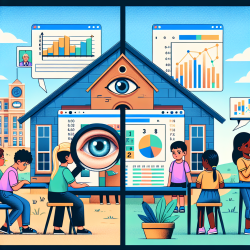Introduction
In the realm of speech-language pathology, particularly when providing online therapy services to schools, understanding the cultural ecosystem services (CES) can significantly enhance the effectiveness of interventions. The research article "A Protocol for Eliciting Nonmaterial Values Through a Cultural Ecosystem Services Frame" provides valuable insights into integrating nonmaterial values into decision-making processes. This blog explores how practitioners can leverage these findings to improve their skills and outcomes for children.
The Importance of Cultural Ecosystem Services
Cultural ecosystem services encompass the nonmaterial benefits that individuals derive from ecosystems, such as spiritual enrichment, cognitive development, reflection, and aesthetic experiences. These values are often challenging to articulate but are crucial for comprehensive environmental management and decision-making.
Key Findings from the Research
The research conducted in Hawaii and British Columbia piloted an interview protocol designed to enhance understanding of CES. The study revealed several key insights:
- Qualitative and Spatial Components: The protocol effectively characterized cultural, social, and ethical values associated with ecosystems.
- Maps and Situational Questions: These tools helped respondents articulate complex values that are often difficult to express.
- Open-Ended Prompts: Allowed respondents to express a diversity of ecosystem-related values, highlighting the flexibility needed in interviews.
- Salient Values: Certain values frequently mentioned during interviews were particularly significant for specific populations.
Implications for Practitioners
For practitioners in speech-language pathology, integrating these findings can enhance therapy outcomes by considering the broader cultural and environmental contexts of children. Here are some practical steps:
- Incorporate Cultural Contexts: Understand and incorporate the cultural backgrounds and environmental interactions of children in therapy sessions.
- Use Open-Ended Questions: Employ open-ended questions to allow children to express their values and experiences, fostering a more personalized therapeutic approach.
- Leverage Visual Aids: Utilize maps and situational questions to help children articulate their thoughts and feelings, enhancing communication and understanding.
Encouraging Further Research
While the study provides a robust framework for understanding CES, further research is encouraged to explore the integration of these values in various therapeutic contexts. Practitioners are urged to collaborate with researchers to refine and adapt the protocol for specific populations and settings.
Conclusion
By embracing the insights from the CES framework, practitioners can make data-driven decisions that consider the holistic well-being of children. This approach not only improves therapy outcomes but also fosters a deeper connection between children and their environments.
To read the original research paper, please follow this link: A protocol for eliciting nonmaterial values through a cultural ecosystem services frame.










